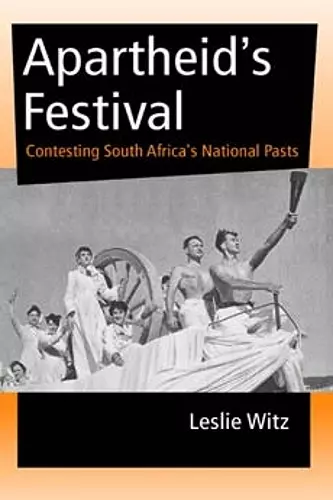Apartheid's Festival
Contesting South Africa's National Pasts
Format:Paperback
Publisher:Indiana University Press
Published:6th Oct '03
Currently unavailable, and unfortunately no date known when it will be back

How a nationalist, separatist agenda was spread by an apartheid-era festival.
Highlights the conflicts and debates that surrounded the 1952 celebration of the 300th anniversary of the landing of Jan Van Riebeeck and the founding of Cape Town, South Africa. This title reveals the expectations of the festival planners and how the festival was engineered and the ANC and other non-Europeans mounted opposition to it.
Apartheid's Festival highlights the conflicts and debates that surrounded the 1952 celebration of the 300th anniversary of the landing of Jan Van Riebeeck and the founding of Cape Town, South Africa. Taking place at the height of the apartheid era, the festival was viewed by many as an opportunity for the government to promote its nationalist, separatist agenda in grand fashion. Leslie Witz's fine-grained examination of newspapers, brochures, pamphlets, and advertising materials reveals the expectations of the festival planners as well as how the festival was engineered, historical figures were reconstructed, and the ANC and other anti-apartheid organizations mounted opposition to it. While laying open the darker motives of the apartheid regime, Witz shows that the production of local history is part of a global process forged by the struggle between colonialism and resistance. Readers interested in South Africa, representations of nationalism, and the making of public history will find Apartheid's Festival to be an important study of a society in transition.
Witz's meticulously researched book focuses on the constructions and contests over South Africa's government—sponsored tercentenary festival in 1952 commemorating the arrival of Jan van Riebeeck, the first commander of the Dutch East India Company's revictualizing station at the Cape of Good Hope in 1652. The organizing committee for the van Riebeeck festival conceived of the event as a nation—building exercise for South Africa's white population, devoting considerable effort to resolving conflicts over how to depict what was perceived to be Afrikaner and British pasts. Following the logic of the National Party's apartheid program, non—Europeans were incorporated into separate pageants that acknowledged and celebrated white settler history as the vanguard of civilization. Given the festival's unapologetic promotion of white supremacy, blacks largely boycotted the event. In fact, the African National Congress launched its defiance campaign in 1952 on April 6, the anniversary of van Riebeeck's landing. As the van Riebeeck festival illustrates, the production of public pasts is seldom straightforward, as it is always limited by previous historical depictions and the ever—present conflicts that accompany any form of commemorative activity. Summing Up: Recommended. Upper—division undergraduates and above.
-- J. O. Gump * University of San Diego , 2004may CHOIISBN: 9780253216137
Dimensions: unknown
Weight: 467g
344 pages